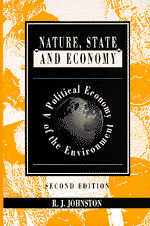

![]()
![]()

Johnston throughout the book examines the motor of capitalism, the logic of its mode of production, in order to emphasise that the dynamism that characterises it (its growth and expansion) is both the cause of contemporary environmental problems and the barrier to their successful resolution. Within this framework, he highlights the historical origins of the western European attitude to the natural world, namely, Judeo-Christian thinking and the resultant anthropocentrism. With the advent of science and technology, European intellectuals developed an arrogant technocentrism that placed faith in humanity's ability to control and use nature as it saw fit, and that any unwanted side effects could be controlled and eliminated via technological fixes. Of course, such attitudes dominated (and still dominate) the capitalistic ethos and its value system - a belief in rationality, efficiency and techno-scientific optimism.
The book then highlights, through a chapter on environmental systems, research from branches of environmental science that show the interlinked aspects of all natural systems, the fragility of their equilibria and their complexity. This is done by Johnston to emphasise how the actions of our species (through the operation of the capitalistic logic of growth and the concomitant need to constantly use natural resources) can undermine many of the environmental systems on the planet.
The rest of the book is a lightweight overview of a number of areas; we are given a brief sketch of what Johnston thinks are the essential characteristics of contemporary capitalism; an analysis of the state and of state action in order to assess the ability to use the state as agent of social and environmental change, and a focus on whether green consumerism can really have any effect in greening consumer capitalism. Frustratingly, Johnston highlights certain areas of contemporary environmental research whose implications are wide ranging for science in general, but does not develop them at all, in particular Chaos theory, which if correct, would mean the impossibility of forecasting and predicting developments in environmental systems. There are a number of additional criticisms of this book. Firstly, although Johnston does touch on the historic complicity of science and technology in the generation of environmental problems, it is left largely untheorized. A look at the bibliography confirms why this is the case. Johnston does not seem to have read any of the very influential works of Ulrich Beck's, Anthony Giddens and a whole range of social theory that focuses on the implications of contemporary environmental problems. Some of which are (a) the contemporary paradoxical status of science viz-a-viz environmental problems (science helped create the problems and yet is the only one that can detect and try to manage them) (b) the debates surrounding reflexive modernization (whether increasing systemic reflexivity in the face of ecological problems can force institutions to alter their actions) (c) the existence of bodies of thought that circulate in the areas of poststructuralism and postmodernism that problematise the very foundations on which science rests. He needed to ground his work in how science, politics and economics have colluded historically to create the problems that characterise our modernity - which is increasingly characterised by a growing uncertainty in science and the increasing loss of trust, by the public, in scientific pronouncements and the institutions of modernity. The result has been the inability of politicians to act on this uncertainty in knowledge (or forms of non-knowledge as Beck has it). Johnston seems unaware of these debates, hence his complete faith in contemporary science as it is presently constituted. What is clear from discussions surrounding the status of science - is the need to develop a scientific theory and practise that has an environmental ethic built into its foundations - and not merely arguing for a more rational application of scientific methodology.
This book had the potential to draw these points out and develop an analysis of modernity (a term not used by Johnston) that indeed could answer the initial two questions posed at the beginning. One reviewer of the first edition (O'Riordan, 1990) pointed out that he felt like writing a piece about what he thought the book should have contained, not what it did; unfortunately, this is still a very tempting option.
John Walls
University of Portsmouth